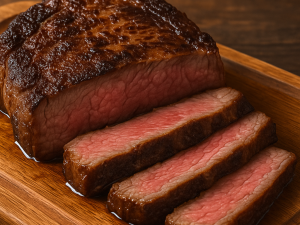Should You Go “All Meat”?
The Carnivore Diet Craze in 2025
The carnivore diet, once considered an obscure fringe movement, has exploded in popularity in 2025. With influencers, biohackers, and even some health professionals touting its simplicity and effectiveness, more people are asking: Is the carnivore diet a smart way to eat, or is it just another health fad?
What is the Carnivore Diet?
The carnivore diet is an all-animal-food diet that excludes all plant-based foods. In 2025, it gained traction due to its simplicity, anecdotal success stories, and alignment with other popular low-carb trends.
At its core, the carnivore diet consists entirely of meat, fish, eggs, and animal-based products like butter and cheese. Followers avoid fruits, vegetables, grains, legumes, nuts, and seeds, essentially any food derived from plants.
What makes it so appealing? For one, the continued backlash against ultra-processed foods and carbohydrates has led many to embrace more ancestral eating patterns. As keto and paleo diets become mainstream, the carnivore diet has emerged as the next-level low carb evolution. Its simplicity is another draw: no calorie counting, no macros, no complicated recipes.
Social media has also amplified the trend, with viral testimonials about weight loss, reduced inflammation, and better mental clarity. Some well-known personalities and influencers have adopted the diet, giving it added legitimacy in the eyes of their followers.
What Are the Main Benefits of the Carnivore Diet?
Many followers report rapid weight loss, likely due to reduced calorie intake and the satiating nature of high-protein, high-fat foods. Inflammation, often linked to autoimmune conditions or chronic diseases, appears to decrease for some individuals when plant-based foods are removed, especially those high in lectins, oxalates, and other potentially irritating compounds.
Others find digestive relief. People with IBS, Crohn’s disease, or other gastrointestinal issues often say they experience fewer symptoms on a carnivore diet. Without fibre or fermentable carbs, bloating, gas, and cramping may subside.
Some users describe improved mental clarity and emotional stability, attributing it to stable blood sugar and the absence of mood-altering compounds found in plants or processed foods.
Additionally, those with a long history of dieting often find the carnivore diet to be refreshingly straightforward. With few decisions to make around food, there is less temptation and more consistency.
Is the Carnivore Diet Better Than Keto or Paleo?
Keto focuses on inducing ketosis by dramatically reducing carbs and increasing fat. While it allows low carb vegetables, nuts, and some fruits, carnivore eliminates those entirely. This stricter approach might work better for those who struggle to stay in ketosis or want a more limited food environment.
Paleo emphasizes ancestral foods, including meat, seafood, fruits, vegetables, nuts, and seeds, but excludes grains, legumes, dairy, and processed items. It’s less restrictive than carnivore and often more sustainable long-term for many.
In contrast, the carnivore diet simplifies everything: just animal products. For people overwhelmed by complicated food lists or tracking macros, the carnivore diet may feel like freedom.
However, keto and paleo may offer a more balanced nutrient profile, including important phytonutrients and fibre. For most people, these diets may be easier to sustain while still providing health benefits.
What Are the Potential Risks of Following the Carnivore Diet?
Nutrient deficiencies are the most immediate concern. While animal foods are rich in protein, B vitamins, and certain minerals, they lack fibre, vitamin C, and many antioxidants. Long-term, this can lead to imbalances unless carefully supplemented.
Sustainability is another challenge. Meat-heavy diets have a larger environmental footprint, particularly red meat and factory-farmed products. Ethically and ecologically, many question whether a global shift toward all-meat diets is viable.
There are also questions about the impact of such a high intake of saturated fat and cholesterol on cardiovascular health. While some studies suggest animal fats are not as harmful as once believed, data on the long-term effects of the carnivore diet is still lacking.
Socially, it can be difficult to maintain. Dining out, attending events, or sharing meals with others becomes complicated when you eliminate plant-based foods entirely.
Can You Get All Essential Nutrients on the Carnivore Diet?
In theory, you can get most essential nutrients from animal products, but the absence of fibre, vitamin C, magnesium, and certain plant-based antioxidants poses nutritional challenges.
Some people argue that nutrient needs change when plant foods are eliminated. For instance, vitamin C needs may decrease due to lower oxidative stress in a low carb, low-toxin environment. Organ meats like liver can provide a broad array of nutrients, including vitamin A, folate, and iron.
Still, certain nutrients like magnesium and potassium are harder to come by in meat-only diets. Over time, this may increase the risk of muscle cramps, fatigue, or electrolyte imbalances. Fibre, which is essential for gut health in most standard dietary frameworks, is entirely absent.
Supplementation is often necessary, though purists may resist it. For those serious about the diet, regular blood testing and consultation with a knowledgeable health professional is advised.
How Does the Carnivore Diet Impact Gut Health?
Many carnivore diet advocates report improved digestion, especially if they suffered from IBS, gas, bloating, or food intolerances. By removing fibrous, fermentable foods, they avoid triggering symptoms.
However, fibre is the main fuel for beneficial gut bacteria. A lack of prebiotic fibres may reduce microbial diversity, which is linked to numerous health outcomes, including immunity, metabolism, and even mental health.
Some research suggests that some carnivore dieters may develop a simplified but stable microbiome that adapts to the diet.1 Still, the long-term effects of this adaptation are unknown.
For those using the diet therapeutically or short-term, gut health might improve. But caution is warranted for extended use without monitoring.
Who Should Try the Carnivore Diet?
People with autoimmune diseases, severe digestive issues, or long-term food sensitivities might benefit from a carnivore trial, under medical supervision.
Anecdotal evidence shows that some individuals with conditions like rheumatoid arthritis, lupus, or Crohn’s disease experience remission-like effects on carnivore. Eliminating dietary triggers and allergens can reduce inflammation and allow the body to heal.
It can also serve as an elimination diet to identify food intolerances. After a period of carnivore eating, some reintroduce foods one at a time to test their tolerance.
Still, it’s not for everyone. People with kidney disease, certain cardiovascular conditions, or a history of disordered eating may be at higher risk and should avoid it unless advised otherwise by a professional.
Is the Carnivore Diet Sustainable for the Environment?
No, the carnivore diet is generally considered less sustainable than plant-rich diets due to its environmental impact, particularly related to meat production.
Beef and lamb have some of the highest greenhouse gas emissions among all foods, alongside land and water use concerns.2 Widespread adoption of the carnivore diet would put significant strain on natural resources.
Some carnivore advocates argue that regenerative agriculture and nose-to-tail eating can offset these impacts. By supporting local farms that use sustainable grazing practices, they aim to reduce waste and carbon emissions.
Still, for the average person, a meat-only diet likely has a higher ecological footprint than balanced omnivorous or plant-based eating patterns.
What Do Experts Say About the Carnivore Diet?
Experts remain divided in 2025, with some open to its short-term use and others warning against its restrictive nature and lack of research.
Nutritionists and medical professionals agree that anecdotal success doesn’t equal long-term safety. There is little high-quality, peer-reviewed research on long-term carnivore dieting, and most evidence remains anecdotal.
However, some clinicians use it as a therapeutic tool. Short-term carnivore diets can reduce inflammation, stabilize blood sugar, and reset gut health in certain patients.
Still, most experts caution against eliminating entire food groups without strong justification. Diversity in the diet typically correlates with better health outcomes.
Should You Try the Carnivore Diet?
If you’re struggling with chronic health issues, the carnivore diet might offer relief, but it should be approached with caution and under professional guidance.
Trying the diet for a short period (e.g., 30-90 days) may yield insights into food sensitivities and inflammation triggers. It’s critical, however, to monitor nutrient status and health markers along the way.
If you’re simply looking to lose weight or eat healthier, a more moderate approach like keto, paleo, or whole-food low carb eating may offer similar benefits with fewer risks.
Ultimately, diet is highly individual. What works for one person may not work for another. Listen to your body, seek professional advice, and consider your ethical, health, and lifestyle goals before going “all meat.”
Is the Carnivore Diet Worth the Hype?
The carnivore diet continues to grow in popularity due to its simplicity and anecdotal benefits, but it’s not a one-size-fits-all solution.
While it may help some people manage specific conditions or reset their dietary habits, it remains an extreme and restrictive approach. The lack of long-term studies and potential nutritional gaps warrant a cautious, informed approach.
For those considering the carnivore lifestyle, education, preparation, and supervision are key. Consider whether your goals require such a strict plan, or if a more balanced, sustainable eating style could offer similar benefits with fewer drawbacks.
More Low Carb Lifestyle Articles
Top Snack Foods
Discover the ultimate guide to keto and low carb snacking! We’ve compiled our favourite snacks and sweets that are both delicious and diet friendly! From chocolatey treats to savoury bites, we’ve got something for everyone!
Zero Carb Foods
Maintaining a low carb diet can be challenging, but with the right foods, it doesn’t have to be. This article is packed with product recommendations to help you stay on course. Discover how to fully embrace a keto or low carb diet with delicious meals that satisfy every craving.
Is Going Low Carb Healthy?
Interested in making the switch to a low carb diet but worried about adverse health effects? Learn more about the role that carbs play in your diet and how they affect your overall health and fitness goals to determine if a low carb diet is the right choice for you.
30 Low Carb Foods
Looking for delicious and satisfying meals that fit into your low carb lifestyle? Explore our list of 30 healthy low carb foods, including pantry staples and specialty products.
Getting Started with Keto
The keto diet, as it is commonly known, has surged in popularity due to the dramatic results that people have experienced. However, there remains some skepticism about how it works from those who are new to high-fat and high-protein eating. Learn more about this diet here.




















